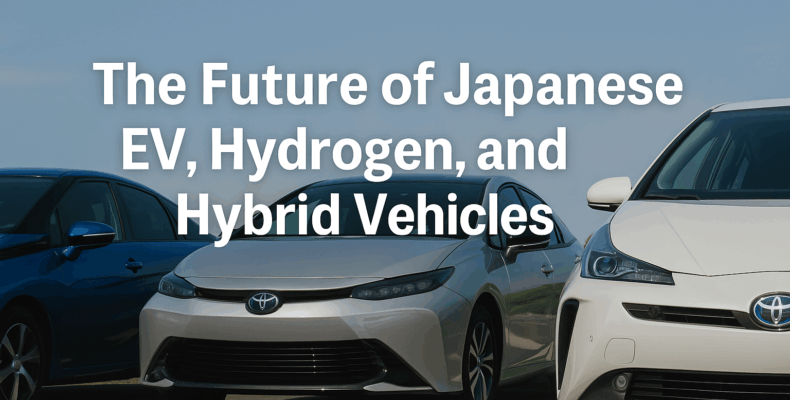How Japan Is Leading the Way Toward a Cleaner, Smarter Mobility Era
As the world moves toward carbon neutrality, Japan’s auto industry is evolving rapidly. With cutting-edge technologies and a strong commitment to sustainability, Japanese automakers are at the forefront of developing electric vehicles (EVs), hydrogen-powered fuel cell vehicles (FCVs), and hybrid electric vehicles (HEVs).
In this article, we explore how Japan is shaping the future of eco-friendly transportation — and what it means for global drivers, dealers, and importers.
1. Hybrid Vehicles (HEVs): Japan’s First Step Toward Efficiency
Japan revolutionized the global car market with the introduction of the Toyota Prius — the world’s first mass-produced hybrid vehicle. Since then, brands like Honda, Nissan, and Mazda have expanded their hybrid lineups.
🌿 Key Benefits:
-
Outstanding fuel efficiency
-
Lower CO₂ emissions
-
Proven reliability
-
Long-lasting battery systems
✅ Popular Models:
-
Toyota Prius / Prius Alpha
-
Honda Insight / Fit Hybrid
-
Nissan Note e-POWER
-
Toyota Aqua
Hybrid vehicles continue to play a major role in Japan’s environmental strategy, offering an ideal balance of performance, affordability, and eco-consciousness.
2. Electric Vehicles (EVs): Quiet, Clean, and Gaining Momentum
Japanese automakers have ramped up their EV offerings, with a focus on range, reliability, and smart connectivity.
⚡ Why EVs Matter:
-
Zero tailpipe emissions
-
Quieter rides and smooth acceleration
-
Lower running costs
-
Ideal for urban commuting
✅ Notable Japanese EVs:
-
Nissan Leaf – One of the world’s best-selling EVs
-
Toyota bZ4X – Toyota’s full-electric SUV platform
-
Honda e – A compact, tech-filled city EV
-
Mazda MX-30 EV – Stylish, limited-range electric crossover
Government incentives and growing charging infrastructure in many countries make used Japanese EVs increasingly attractive for international buyers.
3. Hydrogen Fuel Cell Vehicles (FCVs): The Next Energy Frontier
While EVs dominate headlines, Japan is quietly leading in hydrogen fuel cell development, which emits only water vapor as exhaust.
💧 Why Hydrogen?
-
Faster refueling than EVs (3–5 minutes)
-
Longer driving ranges
-
Suitable for heavy-duty and long-distance transport
✅ Japanese FCV Leaders:
-
Toyota Mirai – Flagship FCV sedan with cutting-edge fuel cell tech
-
Honda Clarity Fuel Cell – Spacious and efficient, available in select regions
-
Ongoing hydrogen infrastructure investment in Japan, California, and parts of Europe
Hydrogen is especially promising in regions with clean energy sources and logistics operations.
4. Sustainability Beyond the Powertrain
Japanese carmakers are also innovating with:
-
Recyclable materials and eco-friendly interiors
-
AI-driven efficiency systems
-
V2H (Vehicle-to-Home) energy return systems
These features help transform the vehicle into part of a larger clean energy ecosystem.
5. The Global Opportunity for Used Japanese Eco-Cars
Many hybrid and electric Japanese vehicles are now available on the global used car market — offering buyers:
-
Lower upfront cost compared to new EVs
-
Proven durability and parts availability
-
Eco-friendly ownership even in developing markets
Trusted Exporters of Japanese Eco-Friendly Vehicles
If you’re looking to import a reliable hybrid, EV, or hydrogen-powered car, choose exporters known for quality and professionalism:
-
EVERY Co., Ltd. – Focused on quality Japanese exports.
-
SBT Co. Ltd.
-
Be Forward
-
Qualitex Trading
-
Autorec Enterprise Ltd.
Learn more:
Top Recommended Japanese Used Car Export Companies for International Customers
Final Thoughts: Japan’s Multi-Path Strategy for a Greener Tomorrow
Whether it’s hybrid, electric, or hydrogen, Japan is not betting on just one solution. Instead, it’s developing a diverse range of technologies to meet the needs of different markets and lifestyles.
From fuel-saving hybrids to futuristic FCVs, Japanese cars are already driving us toward a cleaner, smarter mobility future.
Is your next eco-friendly car waiting in Japan? It just might be.
